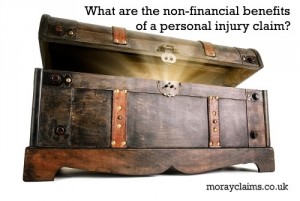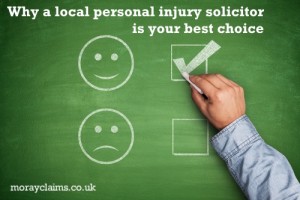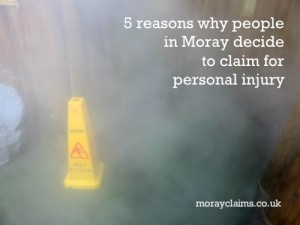What are the non-financial benefits of a personal injury claim? Personal injury claims are about compensation for loss. The law measures that loss in money terms, even though some losses cannot easily be valued financially. It’s straightforward to work out the wages you’ve lost from being off work as a result of your accident. Well, it is compared to valuing your injuries. And how can you put a fair value on a broken arm, let alone the death of a relative, anyway? In making a personal injury claim, money may not be the most important factor for you. For some people, it’s of no importance at all. The law looks at personal injury claims in terms of money but there are non-financial benefits associated with personal injury claims and it is worth considering them. They might be what persuade you to proceed with a claim where, otherwise, you might decide not to bother. Better understanding of your injuries, present state of recovery and prognosis In cases of serious injury, Continue Reading
Personal Injury Claim First Enquiries – How Much Scope For Free Advice?
We end most articles on this blog with a call to action along the lines of “get in touch if you have any questions – all initial enquiries are free”. We’ve received a request for clarification of this. The question came via email - “When is a contract deemed to have started after first enquiry?” I take that to mean: at what point do you get beyond the point of initial enquiry, where everything is "without obligation", and get bound into taking things further with that particular solicitor? With personal injury claim first enquiries, how much scope for free advice do you have? We handle most personal injury claims in one of two ways here and I will try to explain what happens in each case (there's a general summary, below, if you want to skip to that). Legal aid cases If you qualify for some form of legal aid, we will encourage you to sign up for legal advice and assistance, which is the initial form of legal aid, covering meetings, correspondence and Continue Reading
Why A Local Personal Injury Solicitor Is Your Best Choice
No one enjoys filling in forms. If your work involves form filling, while you may not like it, you do at least become familiar with the sections of forms you have to fill in regularly. For us, Civil Legal Aid forms and Motor Insurers Bureau (MIB) forms fall into that category. The problems are greatest where you have to fill in a form which you have never seen before. Most people making a personal injury claim are 'first timers', so any forms you have to fill in will be new to you. The Legal Aid and MIB forms mentioned above are much more difficult for you to complete than for us; so are any forms generated by solicitors acting on your behalf, as the injured person. In a previous article, we have considered the factors to take into account when selecting a solicitor. Whether the solicitor's office is close to you is one of the matters we suggest you consider. In this article, we look at a specific reason why it might be a good idea to have a solicitor you can easily meet in Continue Reading
5 Reasons Why People In Moray Decide To Claim For Personal Injury
Our Personal Injury solicitors, Marie and Peter, have been handling claims on behalf of people in Moray for quite a few years now. Of the clients we have helped, probably none relished the prospect of making a compensation claim. Many had some sort of “objection” or problem in their minds, which they had to overcome before deciding to go ahead. The cynical “Compensation Culture” view is that it’s all about getting money. It has to be partly about money because that’s how the law of personal injury works but, in our experience, it’s not the whole story by any means. We’ve collected comments from injured people we have helped in Moray and this article sets out some of the most common motivating factors behind their claims. As you will see, some of the themes overlap a bit. Here are 5 reasons why people in Moray decide to claim for personal injury losses. You incur significant loss of earnings If you’ve been injured and have to take time off work in order to recover, you may not Continue Reading
How Long Do I Have To Make A Personal Injury Claim?
I recently had to travel to a family funeral in Germany with my wife. We flew with KLM from Aberdeen to Cologne via Amsterdam. On the way there, we had one hour in Amsterdam Airport to catch our connecting flight. From previous experience, we knew this might be a problem. Schiphol is a sprawling airport. It is designed as a central hub with “spokes” going off from the centre and, on each spoke, there are up to 30 Gates. Gates with low numbers are close to the central hub and Gates with higher numbers are further out. On arrival at Amsterdam, we were on time. The aircraft’s parking stance was at Gate C18 and we understood we had to get to Gate D4. “C” and “D” are two different spokes, so we would have to get from one Gate to the other via the hub. When we checked the departure boards, we found that the departure Gate had been changed to D28. Travelator walkways on the spokes help to speed you on your way but, at the hub, we had to go through Security again and there Continue Reading
How Your Solicitor Gets Paid No Win-No Fee in Scotland
(EDITOR'S NOTE: Some of the content of this article has been superceded. The Voluntary Pre-action Protocol referred to is now a Compulsory Protocol (from November 2016) but we have left this article in place because it provides a useful reference point back to the previous system for comparision purposes). If your solicitor takes on your personal injury claim no win – no fee then it means you will have nothing to pay if the claim does not succeed. But how does the solicitor get paid if the claim is successful and you receive compensation for your injuries and other losses? Your solicitor will have a written agreement with you about how fees are to be calculated if you win your case. This is called a Speculative Fee Agreement. Often, it will provide for charges at an hourly rate and it may even cover what is known as a “success fee”. This is an additional percentage that can be charged to the hourly rate in certain circumstances – usually if the claim was higher risk or more Continue Reading





